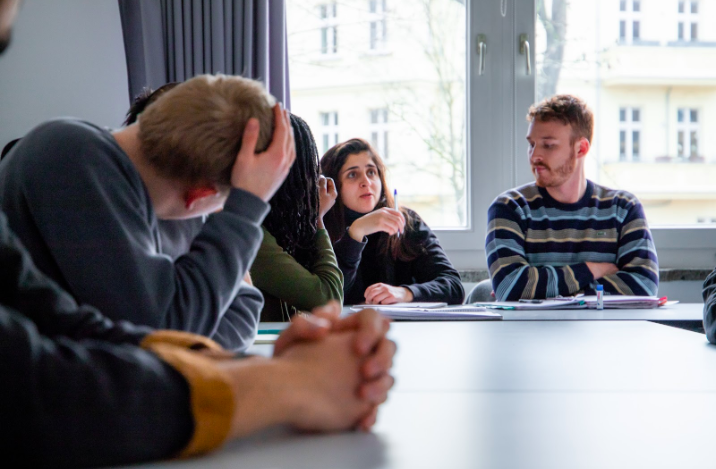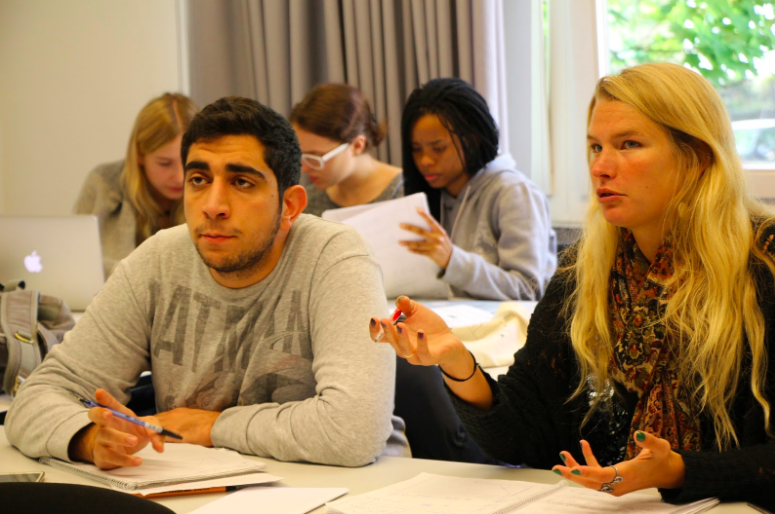The liberal arts focus of Bard College Berlin allows us students to delve into a variety of areas and disciplines as part of our diverse education. Yet, with the freedom of a liberal arts curriculum also comes the difficult part of choosing which path to follow as graduation approaches. I was curious to know more about BCB’s Class of 2020 seniors’ plans for the future, as well as how their learning experiences here have helped them make certain decisions. I naturally expected many to tell me they still didn’t have a clear picture in mind of what their lives would look like in a few months; however, I was interested to hear from them what sorts of options they were considering. With this, the “Senior Interview Series” was born, with the purpose of sharing with the rest of our college community the vast array of possibilities that arise from the different degrees and concentrations offered at BCB, while hopefully inspiring fellow students like me (after all, sooner or later we will also find ourselves in their shoes) to take advantage of our four college years while preparing for what comes next.
My first interviewees are seniors in the Economics, Politics, and Social Thought Program (EPST): Åsa Dahlborn (double majoring in Economics and Politics) and Colomba Dumay (Economics).
Daniela Silva: Tell me a little bit about yourselves… Where are you from? What are some of your interests?
Colomba Dumay: Hi, I’m originally from Chile, and when I’m not studying I enjoy reading good books, going out for coffee, and hiking (although sadly there are no mountains in Berlin).
Åsa Dahlborn: I’m from Sweden, I’m also into hiking and other outdoor activities, as well as going to art and food related events I find around Berlin, but travelling is by far my biggest passion.
D: What are your future plans for after you leave BCB? Where do you see yourself working/ living/ studying in the next year/ next few years?
C: For a while, I’ve been wanting to stay a bit longer in Berlin after I graduate. I’d like to find a job in an NGO working on policy planning or in the marketing sector of a sustainable business, like Einhorn for instance, which produces sustainable condoms. However, I also recently spent some time back home in Chile and I love it there, so if things don’t work out here in Berlin, I’d also be happy to go back. I prefer working for some time before attending grad school because I can learn more about myself, my strengths, and what I’m interested in, to then choose the right master’s program to take. There are so many options for students majoring in both Economics and Politics, and I feel like gaining work experience beforehand helps to narrow these down.
A: I also don’t have a concrete plan in mind, but even though I find Berlin to be a great city to live and work in, I’d like to move to the south of Europe, like Spain or Portugal. Another option I’d like to explore would be moving to South America, as I’ve lived in Brazil and Argentina before, so that could be interesting. It might not be right after I leave BCB, but I can see myself working at an NGO, human rights organization, embassy or with something related to languages in South America for sure. You could say I’m very open to all the possibilities… Then, after one or two years, I’d like to pursue a master’s degree. I feel the same way as Colomba about the benefits of working before getting back to study mode again.
D: Now, I invite you to reflect a little on your education. What do you feel like you will take from what you’ve learned during your time at BCB to your personal and professional life after graduating?
C: I feel like BCB has given me the ability to engage in conversations about concepts like the meaning of life, or metaphysics in a way I’d never expected before. I sometimes find myself discussing these philosophical concepts outside BCB and realize it goes beyond just knowing something for class, rather this kind of knowledge can be applicable to life in general. Thanks to BCB, I’ve met people from so many different backgrounds and cultures, and because this is definitely not a place for judgement, it opened my eyes to the way I might have judged people incorrectly in the past, so now I judge myself for judging. This is probably my biggest personal transformation. I like to say my life motto now is ‘we are not really strangers.’
A: I was initially quite skeptical about the philosophical aspect of the programs at BCB, yet it was precisely this that allowed me to learn how to actually think critically and analyse everything, which is something I value very highly nowadays. Another thing to mention is the fact the classes are so small in size, allowing us to voice our opinions, share our concerns and learn how to defend our arguments, which are skills you can only possess in this type of seminar- based academic environment. Finally, I think it’s great that we have professors with diverse qualifications like Martin Binder, who teaches a class I’m currently taking called Ethics and Economics. He is an economist, yet also has an MA in philosophy, and I believe it isn’t so common to mix both fields. To me, it is super important to learn economics through a philosophical lens too.
D: What was the highlight of your college experience?
C: The people I met and friendships I started here, which I have no doubt will be for life.
A: For me, it was going to Brazil, for my study abroad year. I was able to get a totally new perspective of the world at PUC- Rio and took amazing courses there.
D: What were some of the struggles? Was there anything you wished had been different?
C: I struggled with some of the core courses mainly, like the Renaissance Art and Thought one, which students take in their second year. For many of us EPST majors who have no prior knowledge about art, it would be nice if each semester we had options of core courses to take that linked better to our major or more lectures in the beginning to build a strong analytical foundation about art and literature.
A: I agree with Colomba on this point, I think it comes down to having more options in the core curriculum that equally encompass both EPST and HAST.

D: What are some classes that influenced you at BCB?
C: Last semester I took an Econometrics course and I loved our final project. My group chose to investigate West and East Berliner’s views on immigration, so we conducted a survey and analysed the responses we got. What I really liked about the course was again that it was so applicable to real life, because the tools we gained and the methodology we learned from the class can be used to investigate so many other topics. The final project for the Policy Analysis course was also very interesting. We had to pick an NGO to follow during the semester and do whatever they were doing in class as well, such as writing policy briefs. I picked Amnesty International and, by the end of the semester, I could see myself actually working at an NGO because of this classroom experience. Lastly, the Writer/Artists/Activistas! Writing intensive course was very inspiring to me. Since it was about activism, we watched a couple of documentaries like Vic Muniz’s Wasteland and these prompted a lot of written reflection.
A: There are a couple both at BCB and PUC-Rio that I really enjoyed. At BCB, Global Citizenship was one of my favorites because of our joint projects with students from Al-Quds in Palestine from the Bard Network, which was a great way to put the main concept of the class, “Global Citizenship,” into practice. Also, Plato’s Republic & its Interlocutors core course was such a good foundation and introduction to our degree program, I associate so many things with the allegory of cave, for example. At PUC, I took a course about human rights in Latin America that gave me such a different perception of the subject, as I became aware about the misconceptions that people have about human rights in the South. I would have never been able to get this perception from a university in Europe.
D: Could you tell me a little about your thesis?
C: I will be writing on the topic of tiny houses, which consists of living a minimalist life and spending less. The question I will address will be: “Is there a demand for tiny houses in Berlin?” I feel like tiny houses have a potential to solve many issues in the world including environmental problems as well as housing crises, which is the case of Berlin nowadays. Yet, they are not legitimate and are still not very popular, which makes it hard for individuals and families who don’t have money to pay upfront to purchase these houses and to deal with the bureaucracy involved. I’m trying to make a case that there is indeed a demand for them and they can be a very useful alternative to other types of housing, in the hopes of making the process of living in a tiny house become easier.
A: I’m very passionate about my thesis topic, which is about the Argentine military dictatorship. I’ll be using documents that were just recently released by the US government to compare how the US reported on the repression by the military regime in these secret documents and how they publicly reported on it in the news at the time. I’m excited that I am able to analyse these texts because I was lucky they were just released, making me the first one to do this type of analysis.
D: Do you feel like you’ve changed since you first started studying at BCB? Has your education here shaped your decisions for the future? If so, how?
C: Definitely, not only BCB, but Berlin as a whole has changed me. I feel like I’ve freed myself from any sort of prejudice I had before coming, and I’ve become much more accepting of myself and others.
A: As I said earlier, what changed the most in me was the way I think. I’ve developed an ability to critically assess things and not instantly believe everything I read about, which is very important, especially for the field of international relations that I’m most interested in.
D: As a final question, if you could give advice to someone following a similar academic/career path as yours at BCB, what would it be?
C: I highly recommend studying abroad, it gives you a chance to approach things with another viewpoint. I went to Bologna and it was an amazing experience.
A: I would recommend double majoring if you’re thinking whether you should do it or not. Many people are scared of trying because it might seem impossible to manage two majors but it has been totally fine for me and it helps that Economics and Politics complement each other so well. The only drawback would be that you end up having fewer space for electives. Finally, I would tell anyone who comes to BCB to take full advantage of the readings that are assigned to us, of the student life and cultural events around the city, they are a great opportunity to connect and always learn more.
D: This is all great advice, thank you for talking with me!

